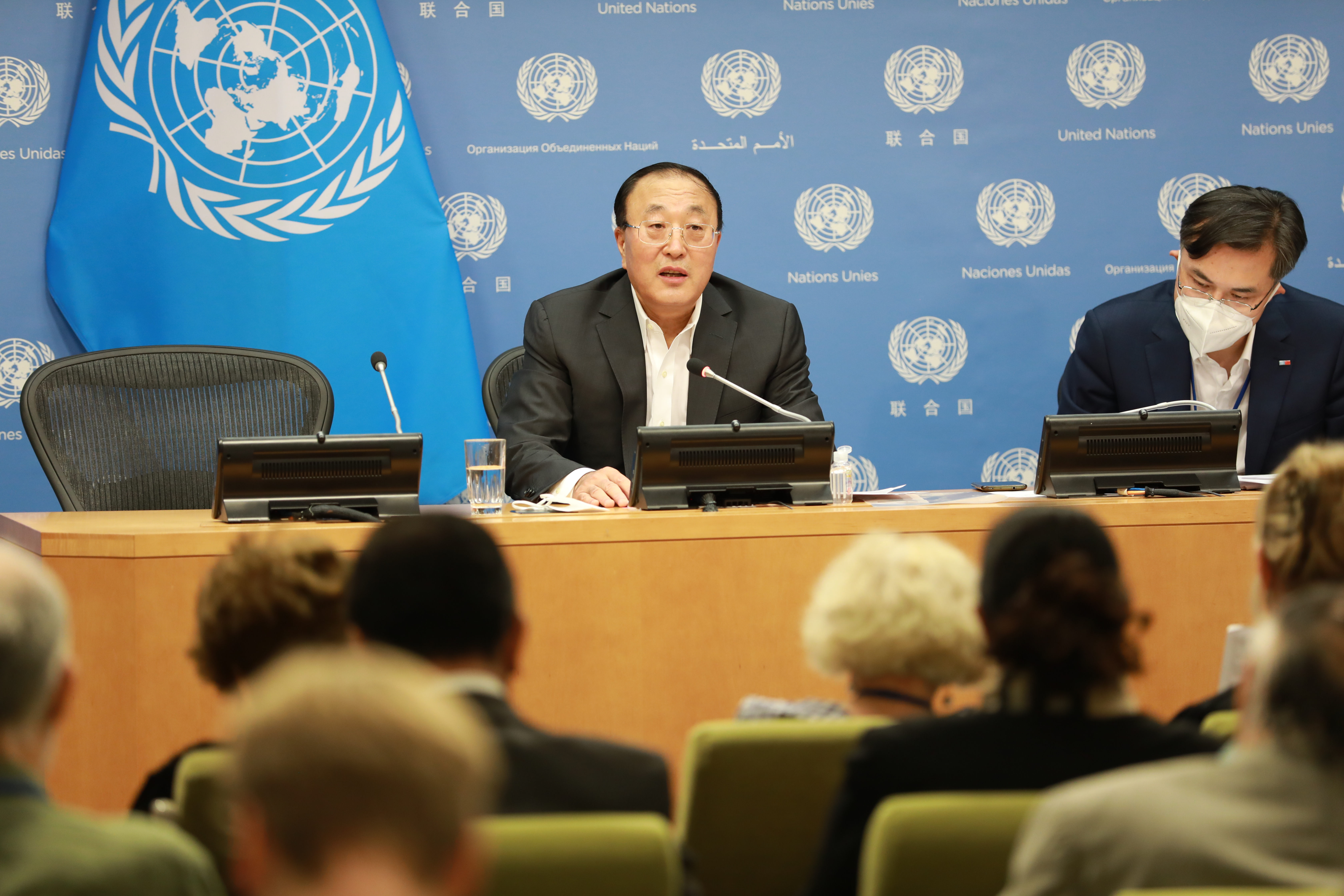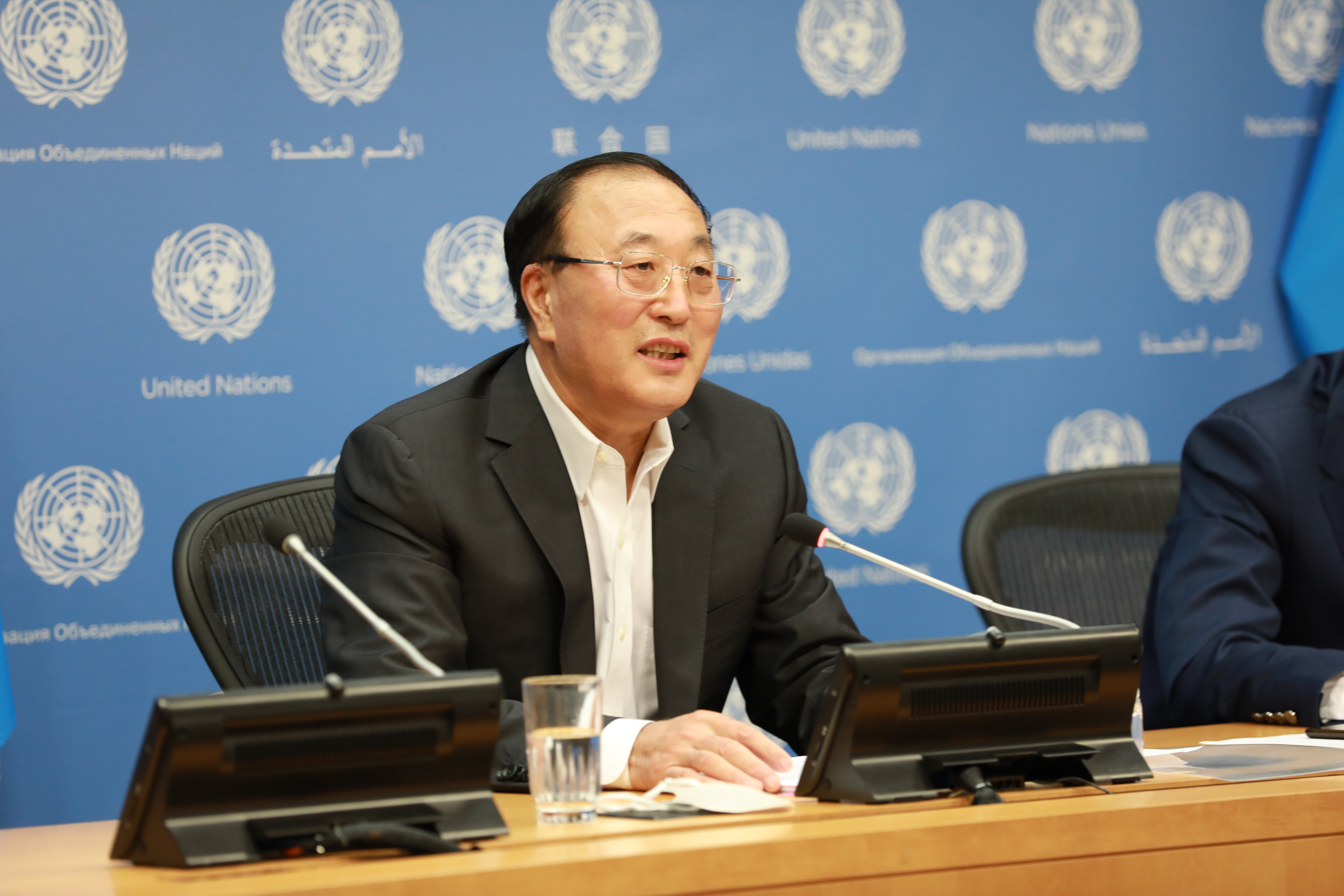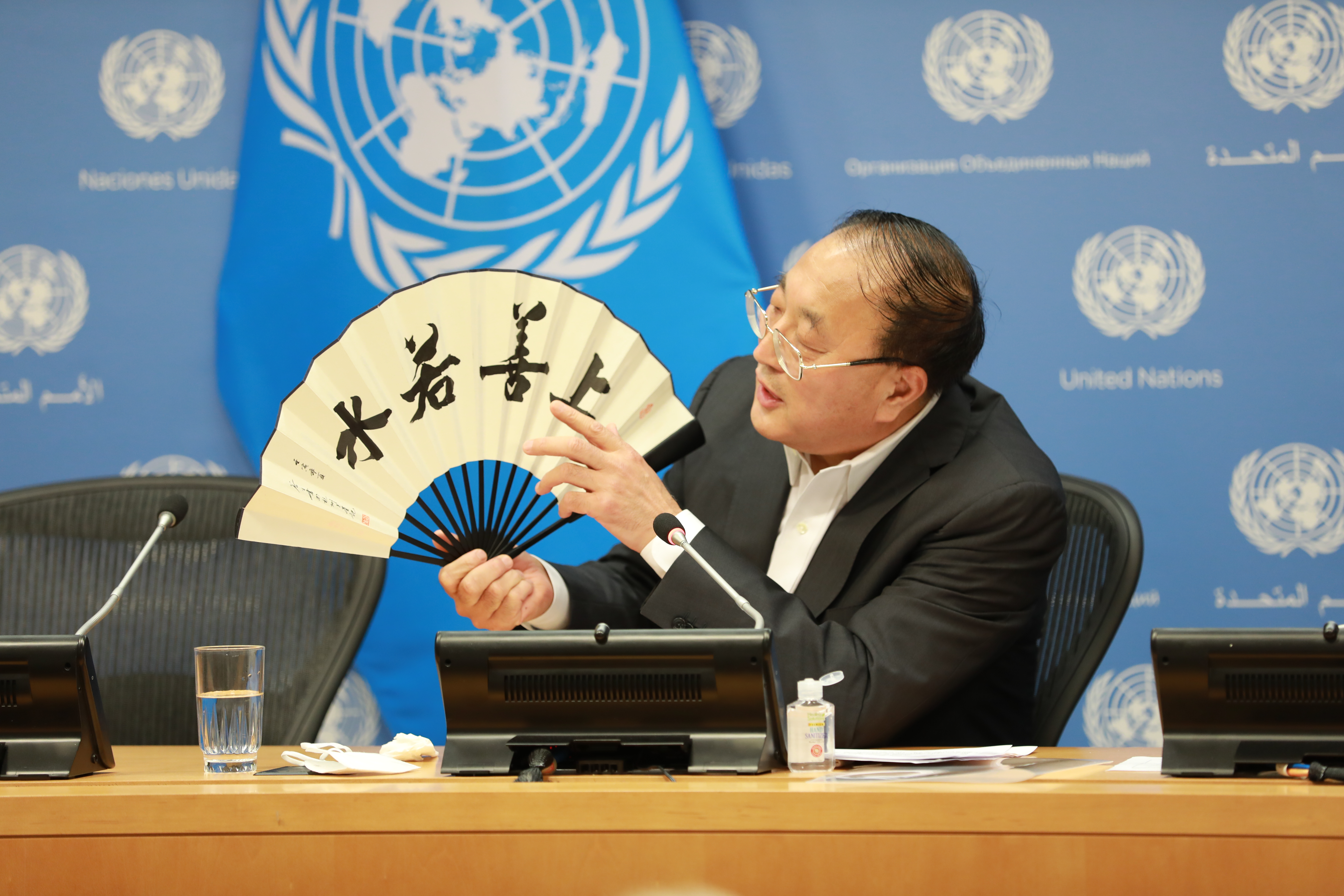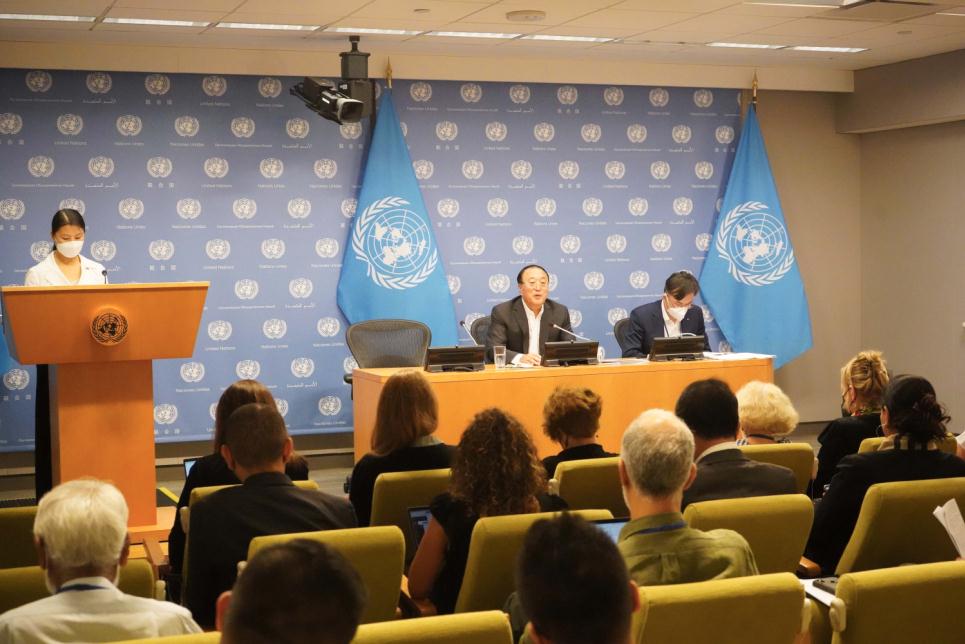| Ambassador Zhang Jun briefs the press on the Programme of Work of the Security Council in August |
| 2022-08-01 23:20 |
|
China is the Rotating President of the UN Security Council for August 2022. On August 1, Ambassador Zhang Jun, Permanent Representative of China to the United Nations, briefed the press on China’s work plans for its rotating presidency in August. Ambassador Zhang said that the world is far from tranquil. We are facing global challenges ranging from political turmoils, military conflicts, terrorist threats, to COVID-19 pandemic, climate change, energy crisis, food crisis, and many others. And the Cold War mentality and power politics have brought greater division, uncertainty and instability to the world. In such a complex situation, all parties expect a greater role by the UN. The work of the Security Council should not and cannot be slackened. Ambassador Zhang stressed that China attaches great importance to its Presidency of the Security Council. We will adopt a responsible and constructive approach, uphold true multilateralism, strengthen communication and consultation with Council members and all other parties, and earnestly perform our presidential duties. I hope through our efforts, the Council will better meet the expectations of all parties, strengthen solidarity and cooperation, and better play its role in maintaining world peace, safeguarding common security, and addressing current challenges. Taking into consideration the Council’s agenda, China will focus its work in the following fields. First, facilitating dialogue and cooperation for common security. Achieving common security for all is the founding mission of the Council. It is also a regular topic here at the UN. At present, with the changing world situation and security challenges, it is highly relevant for us to revisit this issue. The Council must reaffirm its founding mission of maintaining common security, and fulfill its due responsibilities. Therefore, China has proposed to hold a briefing on August 22 on the theme of "Maintenance of International Peace and Security: Promote Common Security through Dialogue and Cooperation". China hopes parties will deeply reflect on questions such as what kind of international security do we really need, how can we get out of conflicts and turmoil and avoid larger security disasters under the current situation, and what role can the UN play. We will invite Secretary-General Guterres to brief the Council. The Secretary-General has put forward the report on Our Common Agenda, and the Secretariat is drafting the new agenda for peace. It is believed that the briefing will help Council members better understand the relevant considerations of the Secretary-General, and at the same time help the Secretary-General heed the opinions and wisdom from all parties. Not long ago, President Xi Jinping proposed the Global Security Initiative. The Initiative offers a systematic answer to the vision, principle and path of common security. It is of great significance for guiding our ongoing efforts in addressing global security challenges. The international community should fully realize that humanity have a shared future. The security of all countries is indivisible. The security of one country cannot be built on the insecurity of others. We must uphold the concept of common, comprehensive, cooperative and sustainable development, and build a balanced, effective and sustainable security architecture. We must champion true multilateralism, respect the sovereignty and territorial integrity of all countries, abide by the purposes and principles of the UN Charter, and stay committed to resolving differences and disputes between countries through dialogue and consultation. We must oppose the Cold War mentality, bloc politics and confrontation between camps, and say no to double standards. We must also uphold both traditional and non-traditional security in a coordinated manner, and together address emerging security threats. China expects all parties to take a forward-looking and responsible attitude to have an in-depth exchange of views at the August 22 briefing, forge basic consensus on some fundamental issues, and take it as a new starting point to together make our world a better place with greater peace.
Second, supporting Africa’s capacity-building for sustaining peace. Many African countries are facing multiple crises such as the COVID-19 pandemic, war and conflict, climate change, and energy and food crises. For them, years of development gains and hard-won peace are in danger of being swept away. In recent years, African countries have been the main victims to the butterfly effect of world economic cycle, global risks, and geo-conflicts outside the region. Such vulnerability warns us that, to help Africa, we must go beyond humanitarian aid, and focus on economic development; we must go beyond short-term assistance, and seek long-term solutions; we must go beyond blood transfusion, and enhance their own blood-making function. The core is to strengthen their capacity-building. China has proposed to hold an open debate on August 8 on the theme of "Peace and Security in Africa: Capacity Building for Sustaining Peace". The aim is to help all parties better understand the challenges and needs of Africa, address the root causes of the problems, and provide more targeted support for the peace and development of the continent. Third, strengthening mediation efforts for the political settlement of hotspot issues. In August, the Council will deliberate on a number of other issues, and many of them are at a critical stage. The truce in Yemen will expire on August 2. Uncertainties remain in Libya. The situation in the Middle East may deteriorate. The crisis in Ukraine is still ongoing. And violence in Haiti is escalating. All these issues require the Council to make good use of its toolbox and play its proper role. As the President, China, together with other Council members, will work closely with Secretary-General Guterres to champion the purposes and principles of the UN Charter, adhere to the right direction of political settlement, step up diplomatic efforts, and encourage dialogue and consultation, so as to cool down conflicts and facilitate the resolving of hotspot issues. Fourth, upholding openness and inclusiveness for the solidarity and cooperation of the Council. The Security Council belongs to all Member States. Facing numerous challenges, solidarity of the Council is more important than ever. China will work closely with all countries and agencies in an open and inclusive manner to form synergy. Over the past month, China has met intensively with the Secretary-General, the Deputy Secretary-General, the President of the General Assembly, members of the Security Council, and parties to relevant issues. In those meetings, we introduced to them our work plans and listened to their views and suggestions. China will encourage Council members to be engaged with each other, promote mutual trust and reduce confrontation. Moving forward, China will work closely with all parties to carry out the duty of the Council for the month of August. China will also stay in touch with friends from the media to ensure transparency of the Council’s work, and we look forward to their strong support. The door of the President’s Office is always open to all colleagues.
Ambassador Zhang said that recently, heat waves are sweeping across the northern hemisphere. People are really feeling the impact of global warming. What we all want most is to cool down. The current international tensions also need to cool down, and the Security Council should be cool-headed in seeking diplomatic solutions to various issues through rational dialogues. That’s why I have prepared traditional Chinese fans as gifts for my fellow Permanent Representatives in the Council. In addressing climate change, China is always a doer. My colleagues and I are not wearing ties today. Throughout August, we will also raise the AC temperature a bit in the Council chamber. We start with ourselves, and we start by doing small things, to do our part to combat global warming with concrete actions. China sincerely hopes to have the support from other Council members, the general membership and the media to help China carry out its duties. I hope with our joint efforts, we can promote positive outcomes in the Council’s work, and make our due contributions to world peace and security. Ambassador Zhang also answered questions from the press, including the 10th Review Conference of the NPT, AUKUS, the DPRK nuclear issue, the export of Ukraine grains, and global food security. On the 10th Review Conference of the NPT, Ambassador Zhang said that the NPT is the cornerstone of international nuclear disarmament and non-proliferation regime, and a key component of post-war international security system. It is hoped that the international community will take the 10th Review Conference as an opportunity to uphold the universality, authority and effectiveness of the NPT, advance in a balanced manner the three pillars of nuclear disarmament, nuclear non-proliferation and peaceful uses of nuclear energy. Countries with the largest nuclear arsenals shoulder a special and primary responsibility, and should take the lead in advancing the three pillars. Earlier this year, the leaders of the five nuclear-weapon states issued the Joint Statement on Preventing Nuclear War and Avoiding Arms Races, affirming that a nuclear war cannot be won and must never be fought. This has sent out a powerful message. The five nuclear-weapon states should uphold the spirit of cooperation and strive for the shared interests of the five states and the wider international community. On the nuclear submarine cooperation between the US, the UK and Australia, Ambassador Zhang said that such cooperation involves the transfer of weapon-grade enriched uranium and related technologies and equipment. Such an act clearly violates the purposes and principles of the NPT. It poses serious risks of nuclear proliferation, and may provoke arms race in the region and threaten regional security and stability. The US and the UK have on many occasions expressed their concerns over the Iranian and DPRK nuclear issues, while condoning this AUKUS cooperation. This is purely double standards. The international community has expressed its serious concerns over such cooperation, and the IAEA has made this issue one of their agenda items. China urges relevant countries to immediate change course and respond to the concerns of the international community with concrete actions, for the sake of the international nuclear non-proliferation regime and regional peace and stability. On the DPRK nuclear issue, Ambassador Zhang said that recent years have witnessed continued tensions on the peninsula. Some countries repeatedly claimed that the DPRK will conduct its seventh nuclear test. However, we cannot jump to conclusions on a hypothetical question. While parties are closely following the DPRK nuclear issue and strengthening non-proliferation cooperation, we should also view the peninsular issue as a whole. Some countries, with their continued joint military exercises, have increased the risk of military confrontation and tensions on the peninsula. China has always insisted on maintaining peace and stability on the peninsula, denuclearizing the peninsula, and resolving issues through dialogue and consultation. In recent years, the DPRK has taken some denuclearization measures, and the previous US administration also took positive actions, However, since then, the DPRK-US dialogue has stalled. It is hoped that the DPRK and the US will resume direct dialogue as soon as possible. In particular, the US side should take meaningful and practical actions to respond to the DPRK’s concerns. Simply relying on sanctions will not help resolve the peninsula issue, and sanctions have already caused a negative humanitarian impact on the people of the DPRK. China is not in favor of the Security Council continuing to impose additional sanctions on the DPRK. We hope that the Council will play a constructive role in improving the situation on the peninsula, rather than adding fuel to the fire. Parties should remain calm and restrained, and avoid any actions that could escalate tensions or lead to miscalculations. They should resume dialogue and engagement as soon as possible, meet each other half way, and promote the political settlement of the peninsula issue On the export of Ukrainian grains and global food security, Ambassador Zhang said that China commends Secretary-General Guterres and his team for the efforts in facilitating the signing of the Black Sea agreement, and welcomes the first ship carrying Ukrainian grains leaving from Odessa port today. This is an important step in alleviating the global food crisis, and also a good start for the peaceful settlement of the Ukraine crisis. China always attaches great importance to the issue of food security. The Global Development Initiatives proposed by President Xi Jinping puts food security as a priority area. China has been working closely with the Food and Agriculture Organization, the World Food Programme, and other agencies to provide assistance to developing countries in need. To address the current food security challenges, China proposed the Cooperation Initiative on Global Food Security, calling for efforts to facilitate access to international markets for food from Russia, Ukraine and other countries, and supporting the efforts of Secretary-General Guterres to this end. As a large country with more than 1.4 billion people, China strives to maintain the stability of its domestic market and the smooth flow of international logistics, which itself is a great contribution to global food security. Some countries use food security as a pretext to attack and smear China only to serve their political purposes. The international community sees clearly who holds the world’s largest food company and who controls the international food pricing. These countries should do some soul-searching and take concrete actions to solve the global food crisis. On August 1, Ambassador Zhang chaired the Security Council meeting, in which the Council adopted the Programme of Work for the month of August. Ambassador Zhang also met with Secretary-General Guterres and exchanged views on the work of the Council.
|
| |||||||||||||
| |||||||||||||



